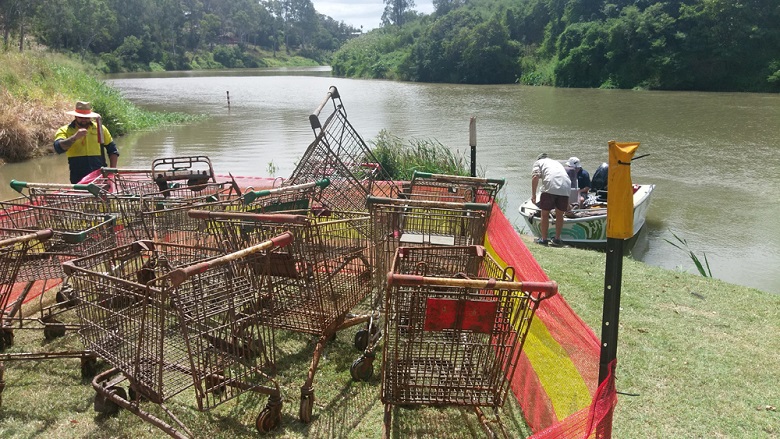The NSW government will consider handing local councils stronger powers to crack down on abandoned shopping trolleys after 1,000 dumped trolleys were picked up in western Sydney alone over two days.
Local government minister Shelley Hancock revealed to Government News on Monday that the government is launching a formal review of the Impounding Act.

“The review will consider the provision of stronger powers for local councils and other potential solutions to reduce the impact of abandoned shopping trolleys on local communities,” she said.
Local Government NSW has been calling for “regulations with teeth” to force supermarkets to take responsibility for shopping trolleys abandoned in streets and dumped in rivers, which have been the source of frustration for councils for years.
Under existing laws councils can only fine customers caught abandoning a trolley or to charge supermarkets impounding fees, but LGNSW wants the state government to give councils the power to slap fines on retailers.
Western Sydney councils have collected more than 1,000 trolleys during two bliztes this year, including 550 that were rounded up last week by a coalition of trolley crusaders including Fairfield, Penrith, Liverpool and Cumberland city councils.
Liverpool Mayor Wendy Waller wants the same standards applied to trolleys as to shared bicycles.
“When shared bicycles became a problem in Sydney’s east, the State Government acted within months to fix the problem,” she said. “Sydney’s west has been plagued by abandoned shopping trolleys for years and we’ve had enough.”
Forcing retailers to take responsibility
LGNSW President Linda Scott said the “staggering” number of dumped trolleys collected in western Sydney highlighted the need for tougher laws.

“Dumped trolleys have plagued councils for years and are a major clean-up problem, especially in built-up suburbs. They end up littering the streets, being left in parks and dumped in rivers and creeks,” Cr Scott said.
She said while councils could fine people who left their trolleys in public places, there was no incentive for owners to take responsibility.
“If history is any indication, the unfortunate outcome of this week’s crackdown will be that most trolley owners won’t even collect the impounded trolleys because there’s no incentive for them to take ownership of the problem,” she said.
“Councils are virtually powerless because they can only fine customers who are caught abandoning trolleys in public places, which is impractical and almost impossible to enforce.”
Cr Waller said some of the previously collected trolleys ended up being crushed by a council loader.
“We told the owners of these trolleys where they could be collected but the reality is they are not interested in doing so,” she said.
“It seems it is cheaper for retailers to just buy more new trolleys rather than collect their old abandoned ones. This only makes the problem worse.
“We have no alternative other than to destroy trolleys if retailers won’t take them back. We don’t want trolleys cluttering our streets or Council facilities.”
NSW councils voted at their annual conference in October to press the state government to change the 1993 Impounding Act to recognise shopping trolleys as the property of individual supermarkets, and to define shopping trolleys as litter.
Liverpool council, which moved the motion, said that would enable substantial fines to be passed on to supermarkets.
Ipswich City Council in Queensland, slaps fines of $667 on retailers that that fail to install wheel locks that prevented trolleys being taken from the shopping precinct.
It has issued 81 fines since they they were introduced in 2013, a spokesman said.
“Council introduced a local law relating to shopping trolleys because of the significant issues that they had been causing in the community when they were not retained on the property of the relevant shop or shopping centre,” he told Government News.
“Anecdotal and material evidence in terms of impounded trolleys indicates that this program has resulted in more trolleys remaining with the retail premises as opposed to on or in public and important environmental areas.”





Good on Ipswitch and the Sydney Western suburbs Councils for taking action. Unfortunately, Georges River Council has a do nothing policy, ignores impounding laws, leaving trolleys to pile up in the streets. Trolley collection companies take several weeks to respond, if at all. The only ways forward are to make wheel locks and/or coin return the law.
I’ve read with interest this article that was written back in November 2019. Did anyone watch the ABC News tonight, where Cumberland Council just crushed 1500 abandoned trolleys that they have collected in the past 3 months? So nothing has been done then. Which government minister will take this on board and change the Impounding Act?